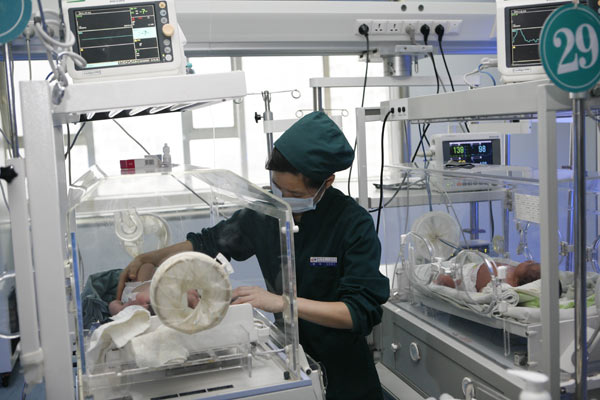 |
| A nurse takes care of newborns at No 1 People's Hospital in Xiangyang, Hubei province. GONG BO / FOR CHINA DAILY |
Song Xi, a 24-year-old nurse, is planning her trip to Germany, but the preparations have been far from easy.
She has only been abroad once before, to Vietnam, and this time her journey will not be a short sightseeing trip, but a working visit for three to five years.
When it comes to hiring nurses, turning to Chinese recruits is nothing new.
As many countries face the problem of an aging society and difficulties in hiring nurses - due to work stress and low wages - employing Chinese workers has become popular in some Asian countries including Singapore, Japan and South Korea.
However, working in Western countries, including Britain and Canada, is an emerging trend. In Germany, the European Union's richest country, such an opportunity for nurses has been allowed only since July.
Song is among the first group of nurses to benefit from the new policy in Germany. Under an agreement signed by China and Germany at the end of 2012, some 150 Chinese nurses will work in the European country from 2013, with the first 25 leaving in October.Medical workers are broadening their horizons, as Yang Wanli reports in Hamburg and Tang Yue in Beijing.
Traveling to Europe has been a dream for Song since childhood, as she views the continent as a place of fairy tales, ancient castles and a different culture. However, studying abroad is too expensive for her family of four from Jingzhou, a city in Hubei province.
Although she couldn't afford to study overseas, Song never abandoned her dream. After studying foreign nursing care at Hubei University of Chinese Medicine for five years, she worked as an intern at a local hospital in 2012.
"But it was hard to practice what I learned in college. For example, health education was not highly valued," she said.
During this time, she heard of the nursing program between China and Germany, feeling the time was right to make a move. "I believe this working experience will give me a chance to be a real nurse," she said.
The shortage of nurses has become a problem in Germany, which has had an aging society for decades.
In July, 4,393 nurses in Germany were registered as unemployed, with 6,792 vacancies announced to the German Federal Employment Agency. For nurses caring for the elderly, there were 3,517 registered as unemployed, with 9,080 registered vacancies.
"In Germany, employers are not obliged to announce their vacancies to the Federal Employment Agency, so the latter figure might be even higher," said Marcel Schmutzler, a press official with the agency's International Placement Services Department.
Franz Wagner, chief executive officer of the German Nurses Association, said that in the past 10 years most of the foreign nurses in Germany came from Poland and Romania.
He said there are cultural differences and differences between the roles of nurses from country to country. "A nurse from Europe probably finds it easier to adjust than somebody from Asia or Africa," he said.

 Storms leave 97 dead, 58 missing in Mexico
Storms leave 97 dead, 58 missing in Mexico New model of indigenous surface-to-air missiles testfired
New model of indigenous surface-to-air missiles testfired  118.28-carat diamond to be auctioned in HK
118.28-carat diamond to be auctioned in HK Maternal love under streetlight
Maternal love under streetlight Naked foreign student sits in the middle of a road in Haikou
Naked foreign student sits in the middle of a road in Haikou  Colorful Yunnan: Enjoy the natural beauty
Colorful Yunnan: Enjoy the natural beauty Harbin named Chinese city with most beautiful women
Harbin named Chinese city with most beautiful women New college students' military training in Guangzhou
New college students' military training in Guangzhou Rugby girls
Rugby girls PLA's 38th Group Army conduct training
PLA's 38th Group Army conduct training Residences of the royal house of Savoy
Residences of the royal house of Savoy The last days of Wan Aihua
The last days of Wan Aihua Highlights at 12th National Games of China
Highlights at 12th National Games of China Beijing Film Academy welcomes freshmen
Beijing Film Academy welcomes freshmen Large mahjong party sets new world record
Large mahjong party sets new world recordDay|Week|Month